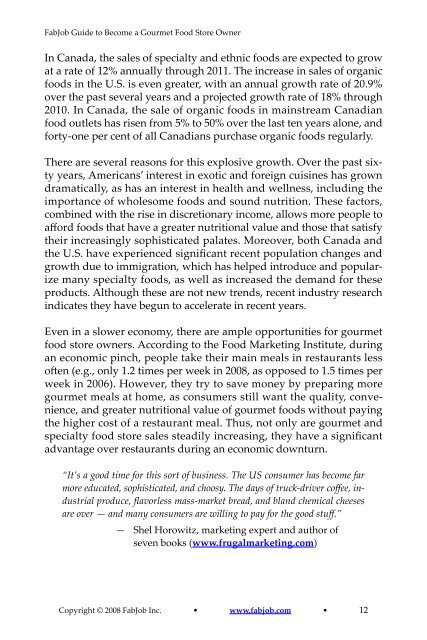Become a Gourmet Food Store Owner - Fabjob.com
Become a Gourmet Food Store Owner - Fabjob.com
Become a Gourmet Food Store Owner - Fabjob.com
Create successful ePaper yourself
Turn your PDF publications into a flip-book with our unique Google optimized e-Paper software.
FabJob Guide to <strong>Be<strong>com</strong>e</strong> a <strong>Gourmet</strong> <strong>Food</strong> <strong>Store</strong> <strong>Owner</strong><br />
In Canada, the sales of specialty and ethnic foods are expected to grow<br />
at a rate of 12% annually through 2011. The increase in sales of organic<br />
foods in the U.S. is even greater, with an annual growth rate of 20.9%<br />
over the past several years and a projected growth rate of 18% through<br />
2010. In Canada, the sale of organic foods in mainstream Canadian<br />
food outlets has risen from 5% to 50% over the last ten years alone, and<br />
forty-one per cent of all Canadians purchase organic foods regularly.<br />
There are several reasons for this explosive growth. Over the past sixty<br />
years, Americans’ interest in exotic and foreign cuisines has grown<br />
dramatically, as has an interest in health and wellness, including the<br />
importance of wholesome foods and sound nutrition. These factors,<br />
<strong>com</strong>bined with the rise in discretionary in<strong>com</strong>e, allows more people to<br />
afford foods that have a greater nutritional value and those that satisfy<br />
their increasingly sophisticated palates. Moreover, both Canada and<br />
the U.S. have experienced significant recent population changes and<br />
growth due to immigration, which has helped introduce and popularize<br />
many specialty foods, as well as increased the demand for these<br />
products. Although these are not new trends, recent industry research<br />
indicates they have begun to accelerate in recent years.<br />
Even in a slower economy, there are ample opportunities for gourmet<br />
food store owners. According to the <strong>Food</strong> Marketing Institute, during<br />
an economic pinch, people take their main meals in restaurants less<br />
often (e.g., only 1.2 times per week in 2008, as opposed to 1.5 times per<br />
week in 2006). However, they try to save money by preparing more<br />
gourmet meals at home, as consumers still want the quality, convenience,<br />
and greater nutritional value of gourmet foods without paying<br />
the higher cost of a restaurant meal. Thus, not only are gourmet and<br />
specialty food store sales steadily increasing, they have a significant<br />
advantage over restaurants during an economic downturn.<br />
“It’s a good time for this sort of business. The US consumer has be<strong>com</strong>e far<br />
more educated, sophisticated, and choosy. The days of truck-driver coffee, industrial<br />
produce, flavorless mass-market bread, and bland chemical cheeses<br />
are over — and many consumers are willing to pay for the good stuff.”<br />
— Shel Horowitz, marketing expert and author of<br />
seven books (www.frugalmarketing.<strong>com</strong>)<br />
Copyright © 2008 FabJob Inc. • www.fabjob.<strong>com</strong> • 12








